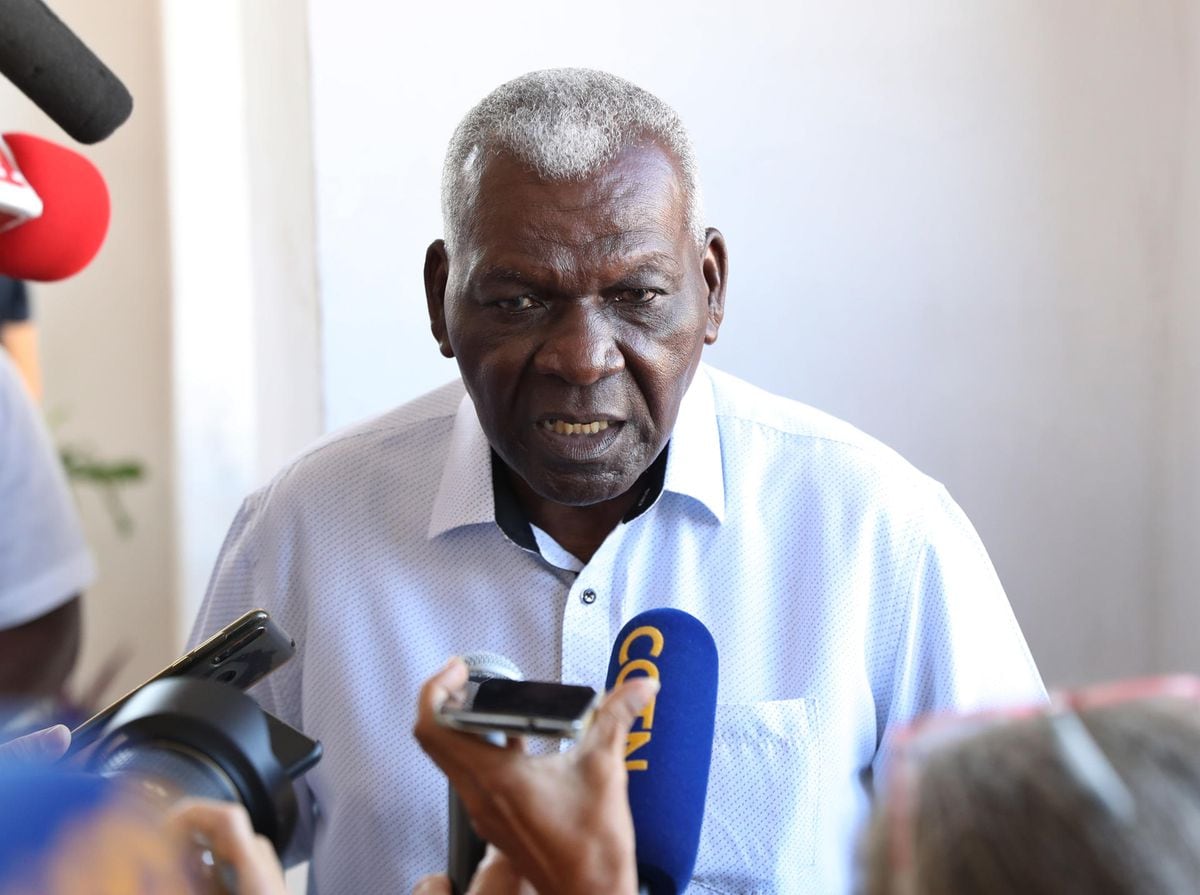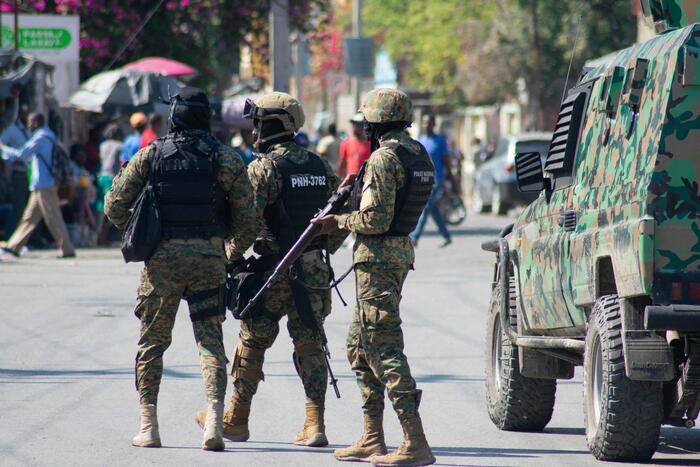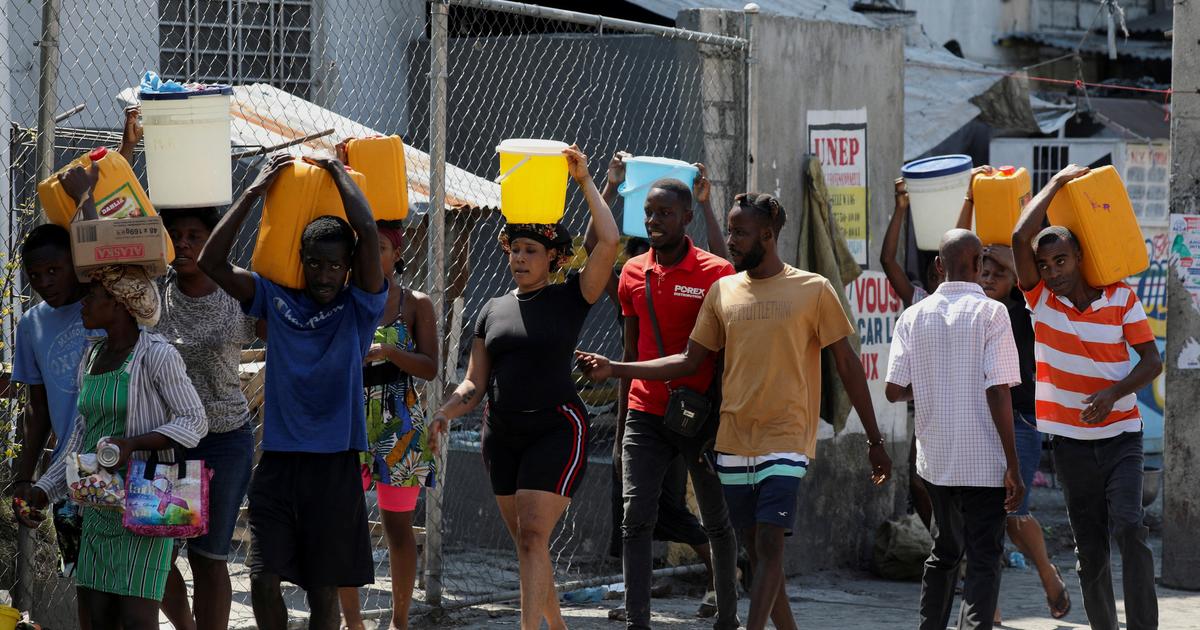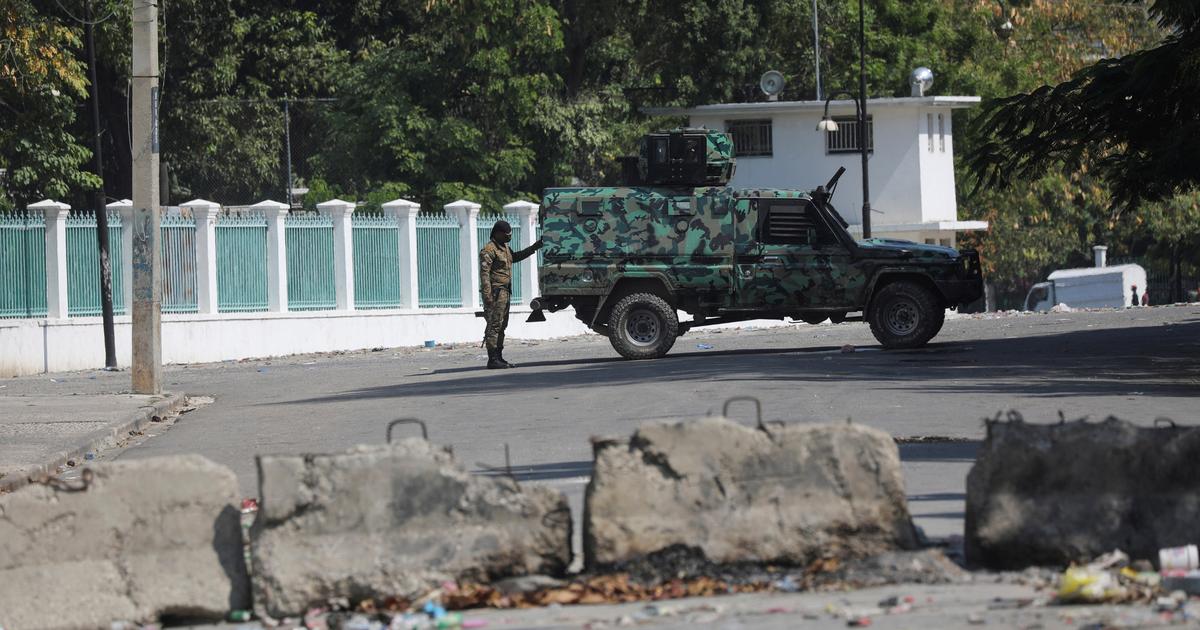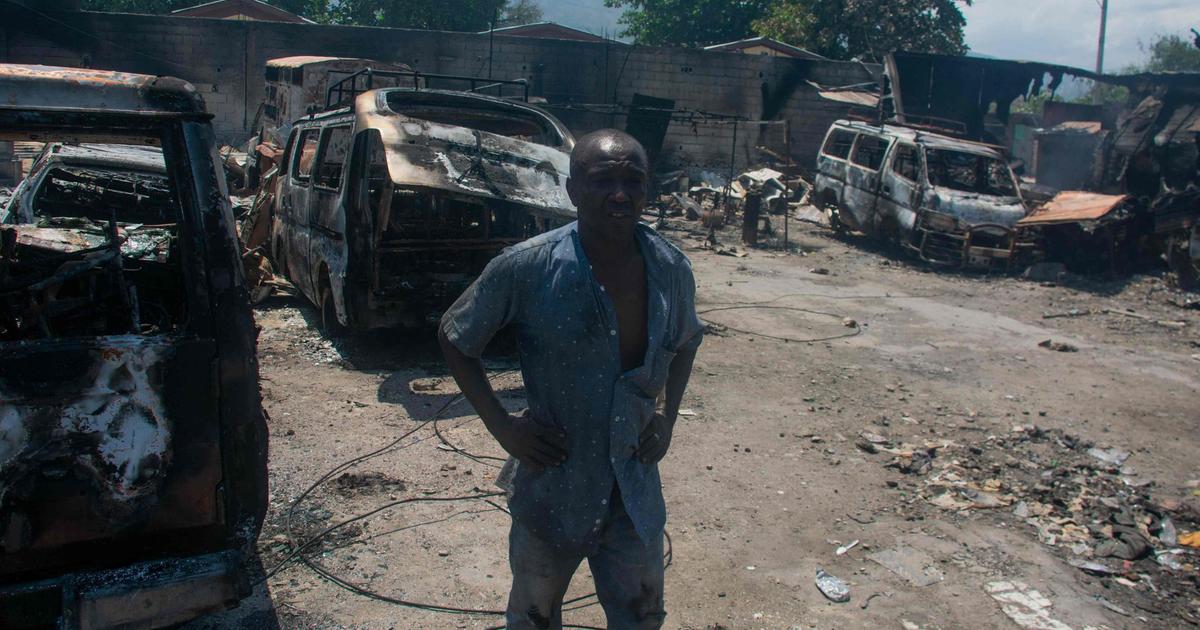Cheering loudly, the people in the tiers sprint along the metal grid, following the man on the lawn below.
It's an election campaign in Kenya and Raila Odinga, the favorite in the running for the presidency, has invited his supporters to the soccer stadium in the city of Kiambu.
But the people in the stands don't run after the 77-year-old candidate, because he hasn't even arrived at the stadium, but is several hours late again.
The cheering crowd follows a heavily built man in sunglasses brandishing a bundle of red safety vests over his head.
He skillfully throws the vests over the metal grid into the dense crowd in the stands, where people push and jump to get hold of one of the free pieces of clothing.
The election campaign in Kenya often looks like a bargain hunt.
Then a young man fights his way forward, he has noticed the journalists from abroad and urgently wants to clarify something.
In a loud voice he calls out, "I'm only here because they give me money.
I actually support the other candidate.' John was taken to the stadium by bus from a village 30 kilometers away, along with scores of other alleged supporters.
He reportedly received 1,000 Kenyan shillings, the equivalent of around eight euros, in order to pretend to be a supporter of Raila Odinga.
The minibuses are piling up in front of the stadium, getting wedged, blocking each other's way, there is a constant honking and roaring of engines.
In addition to the buses, the people being carted up receive instructions on when and how to cheer.
The goal is clear: on the evening news and on Twitter, it should appear as if Odinga has hundreds of thousands of followers in all regions of the country, especially among young voters.
The free vests have now been distributed in the stadium, and a man in a black jacket and baseball cap has positioned himself in front of the ranks.
He practices for Odinga's imminent arrival, throws his arms in the air, the crowd follows suit.
Peter Mwai calls himself »mobilizer«.
He explains what that means in concrete terms: Mwai gets money from the campaign team to fill the stadium with young people.
He organized 1,000 people, he proudly says, who, like John, each receive eight euros for the democracy spectacle.
“Times are tough right now, prices keep rising, many don't even have one euro a day to spend.
If they suddenly get eight euros in their hand, that's a reason to celebrate," says the "Mobilizer."
In view of the inflation in the country, he had an easy hand in finding a thousand cheers for sale.
Although such alms are illegal in connection with election campaigns, hardly anyone is interested in that.
It's an open secret that money fills stadiums, not political beliefs.
For Peter Mwai, campaign times are lucrative times.
All parties hire him to benefit from his network.
Mwai is a delegate to Kenya's National Youth Assembly, tasked with representing the interests of young people in dealings with the government.
For a long time he himself has stopped believing in the promises of salvation that he allows people to celebrate for a fee.
While talking about his job, the 29-year-old points to a ruined building.
It is right next to the stadium where Raila Odinga is about to give his speech.
“It was supposed to be a youth center, hundreds of young people were supposed to find work here.
But the construction site has been standing still for years.
Young people ask themselves: Why should I vote if nothing happens in the end?”
In fact, the numbers do not bode well.
Almost 80 percent of Kenya's residents are under 34, and the country has one of the youngest populations in the world.
In order to be able to vote, you have to be registered.
But young people are clearly underrepresented among the registered voters, and their number has even fallen by five percentage points compared to the last election.
There is talk of an "apathy" among young people.
In Kiambu it is clear that young people have lost confidence in politics.
It's getting louder and louder in front of the stadium.
Four helicopters approach, they land on a meadow right next to the main entrance.
With difficulty, the 77-year-old Odinga climbs out of one of the helicopters, he looks tired and needs some support while walking.
On stage, he then talks a lot about the country's history, praising the incumbent President Uhuru Kenyatta, even though the two were once arch-enemies.
In the meantime, Kenyatta is openly promoting Odinga – because he has fallen out with his main competitor, William Ruto, his incumbent Vice President.
Many young voters have long lost their bearings in this thicket of changing solidarity and backroom deals.
Two days after Odinga's campaign appearance, peace has returned to Kiambu Town.
The buses have disappeared, the pictures from the stadium full of alleged supporters have been posted on Twitter, the helicopters are buzzing over some other city.
A group of young people are training on a soccer field, they practice fast dribbling.
Most of them come from the surrounding slums, some have not eaten anything today.
The soccer field is framed by a high concrete wall with electric wire on it, the wall protects a new wealthy settlement from potential intruders.
Peter Ngugi is standing at the edge of the field in his coat, it's winter in Kenya right now and Ngugi has caught a cold so he can't play today.
He was also in the stadium on Monday and cheered for the presidential candidate Odinga.
He no longer remembers how many campaign events he attended in total.
At home he has T-shirts from all parties, which are now gathering dust on the shelves.
He usually received between EUR 1.50 and EUR 4 to cheer on command, says the 26-year-old: »Of course I know that the politicians are just kidding us.
They come with their big promises, then they disappear, never to be seen again.
But I'm unemployed, so I'm taking what I can with me.« Just like most young people with no income, no prospects and no faith in the warm words of the candidates.
Only four of the 19 players in the football club want to vote this year.
The association was recently to be visited by a local politician, they had already set up tents and bought drinks.
In the end, the politician never came.
It is also such experiences that keep young people away from the ballot box.
The players of the football club in Kiambu are by no means apolitical or even disinterested.
They organize scholarships for poorer students, start fundraisers and look after young people with mental health problems.
"Of course, these are all things that we would expect from our government," says club chairman Alex Mugo.
But since nothing comes, they take matters into their own hands.
That seems more effective than making a cross somewhere next Tuesday.
While the footballers train, William Ruto is also the other likely candidate
for the presidency, traveling in the county.
In the open car
he drives around, a drone takes aerial photos for social media.
Ruto's speeches sound different than Odinga's, he is much younger, livelier.
Ruto comes in a yellow hooded sweater, he wants to specifically appeal to young people.
The candidate presents himself as a man from a humble family, his campaign symbol is the wheelbarrow.
He speaks of redistribution, of jobs for young people, of high food prices.
Ruto didn't send for buses, most of the young people cheering him on seem to be real fans.
Then the candidate discovers a wheelchair user from his massive SUV and instructs his team through the microphone: »Give the man 160 euros!« The crowd goes wild.
Even the incumbent vice president cannot do without money.
And the announced mega rally turns out to be manageable in the end, a few hundred people may have come.
Naomi Kibe and Florah Njuguna are sitting on the upper floor of a café, cars with loudspeakers mounted on them drive by every minute on the street below, and they advertise the two candidates at a completely over the top volume.
The students drink their tea undeterred, talk about the increased college fees, they don't even look down.
They are giving a wide berth to the campaign appearances of Ruto and Raila these days.
"Ruto promises that he wants to do everything differently," says 22-year-old Naomi Kibe, who may be voting for the first time this year.
'But he's helped steer the country as Vice President in recent years.
He could have started things long ago.” Kibe will stay home on election day, checking the news on her cellphone, hoping for a peaceful election.
She doesn't expect more.
She will not cast her vote, like millions of other young people in the country.
Meanwhile, the breaking news spread on Twitter that the banks were running out of 200 shilling notes because of the election campaign.
Cash for the youth – who then don't vote.
This contribution is part of the Global Society project
Expand areaWhat is the Global Society project?
Under the title »Global Society«, reporters from
Asia, Africa, Latin America and Europe
report on injustices in a globalized world, socio-political challenges and sustainable development.
The reports, analyses, photo series, videos and podcasts appear in a separate section in SPIEGEL's international section.
The project is long-term and is supported by the Bill & Melinda Gates Foundation (BMGF).
A detailed FAQ with questions and answers about the project can be found here.
AreaWhat does the funding look like in concrete terms?open
The Bill & Melinda Gates Foundation (BMGF) has been supporting the project since 2019 for an initial period of three years with a total of around 2.3 million euros - around 760,000 euros per year.
In 2021, the project was extended by almost three and a half years until spring 2025 under the same conditions.
AreaIs the journalistic content independent of the foundation?open
Yes.
The editorial content is created without the influence of the Gates Foundation.
AreaDo other media also have similar projects?open
Yes.
With the support of the Gates Foundation, major European media outlets such as The Guardian and El País have set up similar sections on their news sites with Global Development and Planeta Futuro respectively.
Did SPIEGEL already have similar projects? open
In recent years, SPIEGEL has already implemented two projects with the European Journalism Center (EJC) and the support of the Bill & Melinda Gates Foundation: the "OverMorgen Expedition" on global sustainability goals and the journalistic refugee project "The New Arrivals ", within the framework of which several award-winning multimedia reports on the topics of migration and flight have been created.
Expand areaWhere can I find all publications on the Global Society?
The pieces can be found at SPIEGEL on the Global Society topic page.



